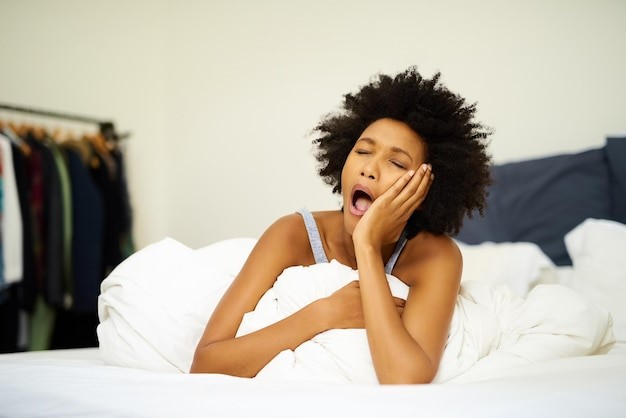Sleeplessness, also known as insomnia, is a sleep disorder that makes it difficult to fall asleep or stay asleep. It can either be acute or chronic, short-term or long-term.
While insomnia can be said to be acute when it stretches from a night to a couple of weeks, it is chronic when it occurs three nights a week for, at least, about three months.
Insomnia can be classified into two main types — primary and secondary.
Primary insomnia is a case where sleeping difficulties are not caused by underlying health conditions; while secondary insomnia is the direct opposite of primary insomnia. It is a situation where underlying health conditions make it hard to fall asleep or stay asleep. It can also be caused by substance abuse or as a form of reaction to some medications.
Insomnia can also result from stress, irregular sleep timing like staying up too late in the night, working in bed, watching TV, using your phone, or playing games right before going to bed.
Experts also warn that eating too much before bed can cause severe inconvenience or discomfort to the body, making it difficult to fall asleep.
Remedies
While there are myriads of over-the-counter medicine for insomnia, they are not expedient options as they come with a host of side effects and tend to lose efficiency after a while.
While acute insomnia would have the individual needing to adjust and make some significant lifestyle changes, chronic insomnia would need a combination of lifestyle changes and a much more comprehensive analysis to diagnose the underlying illness that causes sleeplessness and proffer a solution.
The following tips are some lifestyle changes that can be adopted to help tackle insomnia.
- Create a sleep routine:picking a convenient sleeping and waking timing and sticking to it helps to create a rhythm. Make up a sleeping plan and be consistent with it
- No screen time before bedtime:cutting out the usage of phones, laptops, TVs, and other screens a couple of hours before bedtime would help to relax your eyes and brain. The lights from the screen makes it hard to sleep
- Regular exercise:engaging in slight to moderate exercises moments before going to bed can help to improve your sleep time. However, experts advise keeping it about 3-4 hours away from bedtime, as exercising directly before bedtime can be counterproductive.
- Do away with stimulants:taking stimulants like alcohol, caffeine, and nicotine before going to bed is a bad idea as they would deprive you of sleep and keep you awake. Alcohol might help you fall asleep, but only for a short while, as they tend to wake you up in the middle of the night with headaches.
- Eat right:eating heavily directly before bedtime can reduce your sleep time by keeping you awake for a long. To enable quick sleep, opt for a light snack before bedtime instead. This would help make falling asleep quicker and easier.
- Make your bedroom sleep-conducive:ensure to make your bedroom as comfortable and conducive for sleep as possible. Sleeping with the lights off helps to fall asleep faster, but if you have a problem with the dark, low lights would be a better option. Also, ensure that your room is as quiet and calm as possible as chaos or noise might make it hard for you to drift into a peaceful sleep. Keep your room temperature moderate: not too hot, not too cold.
- Relaxing bedtime rituals:engaging in some activities that can help relax your body and mind would help put you in the right mood for sleep to take over. Try activities like reading a book, listening to soft music, meditating, or taking a shower.
- Avoid or limit nap time:taking naps or sleeping long hours during the day can make it hard to sleep at night when you need it the most. If you won’t be working a night shift, then limiting nap time during the day or avoiding them completely would do a lot of good.
- Restrict your bedroom to sleep and sex:bedrooms are not meant for work and other activities except sleeping or sex. Engaging in other activities like working in the bedroom may send the wrong signal to the brain.
Conclusion
Our entire system needs adequate rest to help repair itself. Not having enough sleep for days on repeat can put an individual at risk of numerous health problems like HBP, depression, anxiety, loss of focus, grumpiness, etc.
The above tips have proven to be helpful over the years in fighting sleeplessness; however, if insomnia persists, see your doctor.


